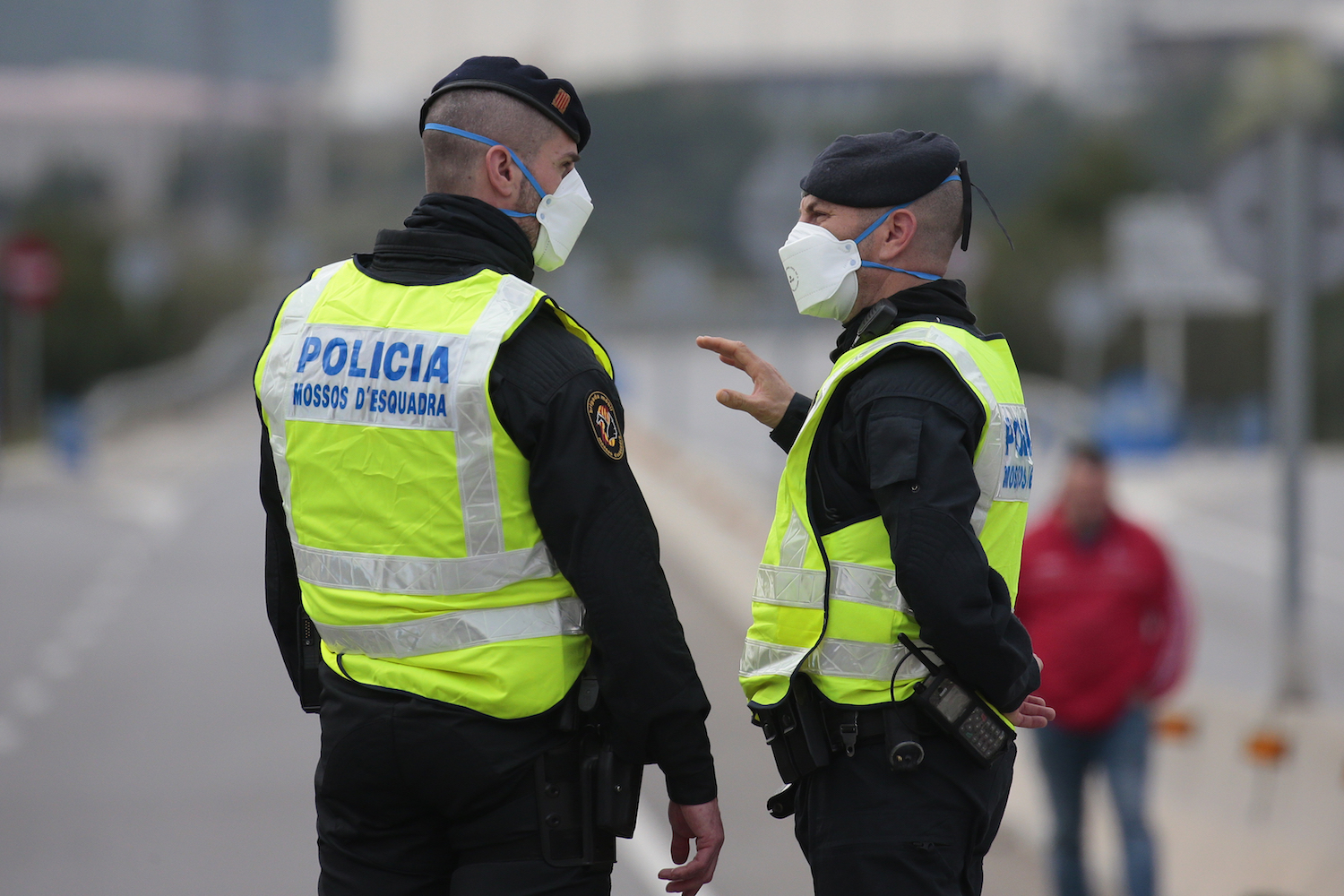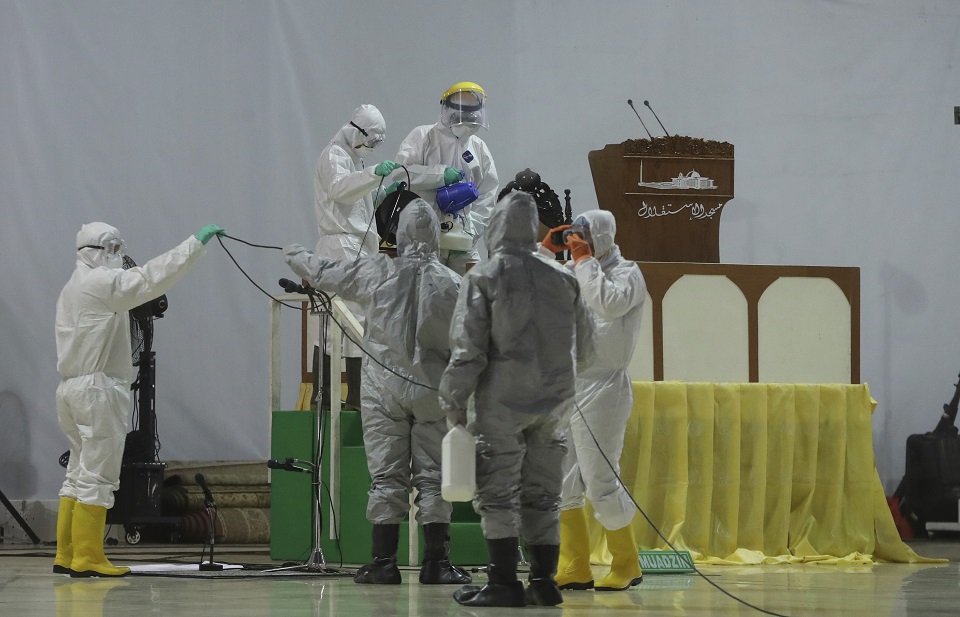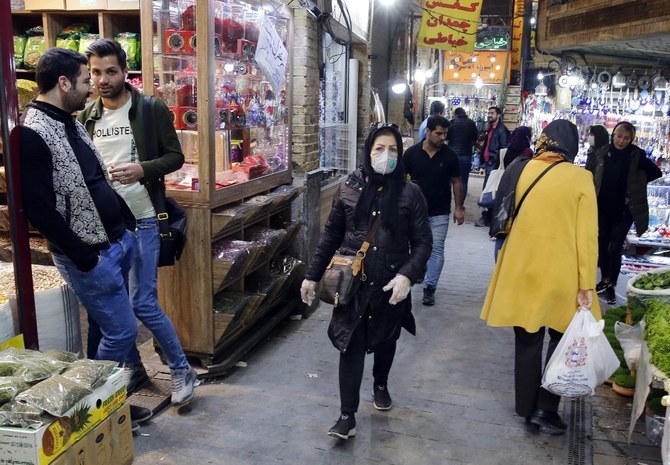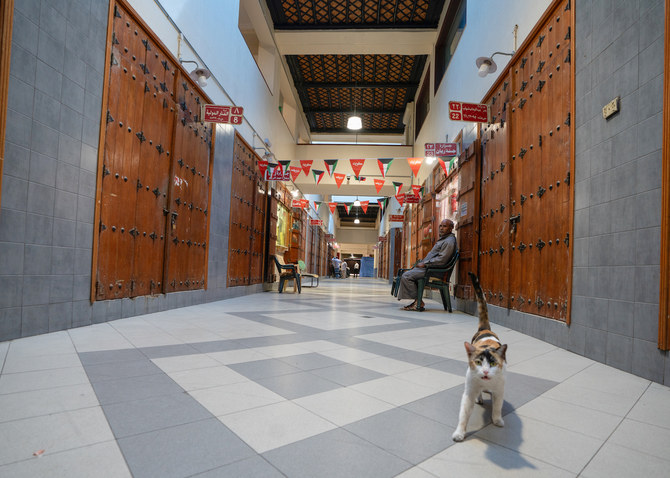DUBAI: As the Middle East continues to grapple with the coronavirus outbreak, governments in the region and around the world have been taking extra precautions to prevent the spread of the virus.
Friday, March 13 (All times in GMT)
21:25 - Ukraine and Poland have closed their borders to foregin travelers as of Friday evening for two weeks, and the former will also begin suspending flights, in a bid to stop the spread of the virus.
20:55 - FIFA has recommended that all international matches scheduled to be played in March and April be postponed because of the coronavirus, the global soccer body said in a statement on Friday.
It added that clubs would not be obliged to release players for any matches which were played.
"The general football rules which normally oblige clubs to release players for national team matches will not apply for the up-coming international windows in March/April," it said.

20:45 - US President Donald Trump said Friday he was considering adding Britain to a ban on travelers from mainland Europe as London warned the coronavirus outbreak may have infected up to 10,000 people there.
20:15 - Stocks in the US surged on Friday, ending a brutal week on somewhat of a high and recouping much of a historic plunge thanks to concerns over the coronavirus, as Donald Trump announced new measures to fight the virus - the Dow Jones was up 1,900 points...

19:45 - US President Donald Trump announced a national state of emergency on Friday, freeing up $50 billion in federal funds for the battle against the fast-spreading coronavirus pandemic.
"To unleash the full power of the federal government, I'm officially declaring a national emergency," Trump said in a statement on the White House lawn.
He called on all US states to set up emergency operation centers and said the government was accelerating testing, amid criticism about the lack of sufficient test kits nationwide.

President Donald Trump, right, listens as Dr. Deborah Birx, White House coronavirus response coordinator, speaks during a news conference in the Rose Garden of the White House, Friday, Mar. 13, 2020. (AFP)
Trump said the federal government was partnering with the private sector to accelerate production of test kits to make them more widely available to Americans.
He said there will be about 5 million coronavirus tests available but doubted that many will be needed. He urged Americans to only seek out the test if they feel they need it.
"We don't want people to take a test if we feel that they shouldn't be doing it and we don't want everyone running out and taking - only if you have certain symptoms," he said.
19:15 - Qatar's health ministry announced 58 new cases of coronavirus on Friday.
19:05 - Morocco will close all schools and universities and other educational and vocational training institutions starting from Mar. 16 until an indefinite date as a precautionary measure against the coronavirus outbreak, the education ministry said on Friday.

Tourists visit the Hassan II Grand Mosque in Morocco's Casablanca on Mar. 12, 2020. (AFP)
19:00 - Saudi Arabia's Ministry of Health has told people returning to Kingdom from certain countries and from certain dates to self-isolate. List below:
February 28 onward: China, Japan, S. Korea, Italy, Turkey, Singapore, Egypt, Lebanon, Iran, Syria
March 8 onward: France, Spain, Indonesia, Switzerland, Germany
March 11 onward: Austria, Denmark, UK, USA, Netherlands, Norway, Sweden
18:50 - According to an unverified internal memo at Beirut's international airport, a number of officials have contracted the virus.
18:40 - Tunisia will immediately suspend prayers in mosques, close cafes at 4pm every day, and ban all cultural, sports and economic gatherings to combat the spread of the coronavirus, Tunisian Prime Minister Elyes Fakhfakh said on Friday.
The government has also closed Tunisia's maritime borders, suspended all flights to and from Italy, in addition to reducing flights with Egypt, Germany, Britain and France.
Tunisia has confirmed 16 cases of the coronavirus, mostly among recent arrivals from Europe, and the disease is expected to hit its crucial tourism sector hard.

18:30 - The UAE on Friday advised elderly people to stay at home and avoid crowded places in order to prevent the spread of coronavirus.
18:20 - Saudi Arabia's health ministry announced 24 new cases of coronavirus in the Kingdom on Friday.
17:50 - The US State Department has summoned the Chinese ambassador to the US over a Chinese foreign ministry's spokeman and his comments that the US military may have brought the virus to Wuhan, according to a US official.
17:30 - Libyan schools will be closed for two weeks, according to the Tripoli government and its rival in Benghazi. The head of the country's disease prevention unit said there were no cases in Libya, but that it lacked adequate isolation facilities.
16:30 - Britain on Friday announced it was delaying May's local elections - including for London Mayor - for a year due to the outbreak of coronavirus.
"We will bring forward legislation to postpone local, mayoral and Police and Crime Commissioner elections until May next year," a government spokesman said.
16:20 - US President Donald Trump is preparing to invoke emergency powers as the country struggles to contain the coronavirus outbreak, according to two people familiar with the planning who spoke on condition of anonymity.
It was still unclear Friday, however, precisely what mechanism Trump would use to free up additional federal resources for testing and treatment as well as help those struggling with the economic impact.
Trump is poised to speak at 3 p.m. (19:00 GMT) at the White House. “Topic: CoronaVirus!” he tweeted.
16:15 - Kuwait called on citizens and residents to stay in their homes and leave only if necessary, the Ministry of Information said.

A cat is seen at Mubarikiya market, following the outbreak of coronavirus, after the government ban to close all companies in Kuwait City, Kuwait Mar. 12, 2020. (Reuters)
16:00 - Oman will suspend the issuance of tourist visas from Mar.15 for a period of 30 days and will not allow cruise ships to dock at the sultanate's ports during this period, the foreign ministry said on Twitter, citing an ad hoc government committee to contain the spread of the coronavirus outbreak.
Sport activities will also be suspended during this period, it said.
15:40 - Leaders of the G7 countries will hold a video conference on Monday to discuss a coordinated response to the coronavirus outbreak, a French presidency official said on Friday.
15:20 - The Louvre in Paris, the world's most visited musuem, said on Friday it was closing "until further notice" because of the coronavirus.
The closure of the museum, which had 9.6 million visitors last year, came after the French government banned all gatherings of over 100 people to limit the spread of the virus.

15:05 - Pakistan will close its border with Iran and Afghanistan in a bid to control the spread of the coronavirus, the interior ministry said Friday.
The closure of Pakistan's porous border with Iran - where hundreds of people have died from the disease - and Afghanistan will start Mar. 16.
It will be for "an initial period of two weeks... in order to prevent the spread of COVID-19, in the best interest of all three brotherly countries", Pakistan's interior ministry said.

Police officers wear masks amid coronavirus fears, as they guard Pakistan Super League cricket matches outside the National Stadium in Karachi, Pakistan Mar. 12, 2020. (Reuters)
14:55 - British Airways will cut jobs after the coronavirus pandemic devastated demand for global air travel, its chief executive Alex Cruz said Friday.
"To be frank, given the changing circumstances, we can no longer sustain our current level of employment and jobs will be lost -- perhaps for a short period, perhaps longer term," Cruz said in an internal memo confirmed by the group.
Meanwhile, German flagship carrier Lufthansa said on Friday it is planning to request state aid from several European governments to weather the fallout from the coronavirus outbreak.

Passengers wearing protective face masks disembark a British Airways aircraft at Terminal 5 in Heathrow Airport, Britain on Mar. 10, 2020. (Reuters)
14:50 - Bad news for sport fans - the Bahrain and Vietnam Grands Prix are the latest to fall foul of the coronavirus chaos...
14:40 - Spanish Prime Minister Pedro Sanchez says the government will declare a two-week state of emergency in a bid to contain the new coronavirus outbreak.
Sanchez said Friday that Spain will "mobilize all resources," including the military, to contain the sharp rise in cases.
He added that it can't be ruled out that the country will see more than 10,000 cases next week.

Police officers stand on the closed off road near Igualada, Spain, Friday, March 13, 2020. (AP)
14:20 - Pakistan on Friday announced a countrywide shutdown of all educational institutions over fears of coronavirus spread.
"It has been decided to close all educational institutions in the country till April 5. This includes all schools and universities, public and private, vocational institutions and madaris," Education Minister Shafqat Mahmood tweeted.

Women wearing facemasks as a preventive measure against the spread of the COVID-19 coronavirus walk on a street in Karachi on Mar. 13, 2020. (AFP)
14:00 - British cases of coronavirus rose 35% to 798 over the past 24 hours, health authorities said.
Britain reported its first confirmed coronavirus case on Jan. 31. There have so far been 10 deaths from the virus in the United Kingdom.

Restaurant seats stand empty in Covent Garden in London, Britain Mar. 13, 2020. (Reuters)
13:45: Flights between Jordan and Egypt will be suspended from Monday over coronavirus concerns.
Jordan’s health ministry said that the country is free from coronavirus infections as the only case reported has now recovered.
13:30 - Lebanon's education ministry said schools will continue to be suspended until Mar.22.

A volunteer sanitizes a mosque, as a precaution against the spread of the coronavirus, in Sidon, Lebanon Mar. 12, 2020. (Reuters)
13:25 - Morocco on Friday suspended all flights and passenger ship traffic to and from France, the state news agency said.
Morocco earlier suspended trips with China, Italy and Algeria.
13:20 - Sudan on Friday reported its first confirmed coronavirus case, a man who died on Thursday and had visited the UAE in the first week of March.
The man, in his 50s, died in the Sudanese capital Khartoum, the Health Ministry said in a statement.
13:15 - The UK's Prince Charles has canceled all of his upcoming visits to Bosnia, Cyrpus and Jordan due to the coronavirus outbreak, according to a British government statement on Friday.
"Owing to the unfolding situation with the coronavirus pandemic the British government has asked their royal highnesses to postpone their Spring tour," a spokesman said.

12:45 - Kuwait’s health ministry announced 20 new cases of coronavirus, bringing the total number of cases to 100.
12:30 - Iran said Friday the security forces will clear the streets nationwide within 24 hours so all citizens can be checked for coronavirus - its toughest measure yet to combat the outbreak.
12:15 - Bulgaria's foreign ministry on Friday banned all travel to Iran and advised Bulgarians to cancel all non-urgent travel to Spain and South Korea in a bid to curb the spread of coronavirus.
Bulgarians were to avoid any non-urgent travel to certain areas in France, Germany and Japan. Travel to Switzerland, Norway, Denmark, Sweden, the Netherlands and the United States should be undertaken only after careful checks of the situation there.
12:05 - Iran, which is mired in the worst outbreak in the region, announced another 85 deaths, pushing its total number of fatalities to 514 amid 11,364 confirmed cases. The real number of cases might be even higher, as questions have been raised about authorities' transparency.
11:55 - Bahrain's health ministry announced nine new cases of coronavirus on Friday.
11:50 - Kuwait's religious authorities asked Muslims to pray at home on Friday as Gulf Arab states stepped up measures to fight the spread of the new coronavirus.
11:41 – Iraq has banned domestic travel between provinces from March 15 to 25 except for emergencies, trade, and employees commuting, due to coronavirus. Major religious gatherings were also prohibited during the Islamic month of Rajab, which falls from February 22 until March 24.
11:35 – Iraq has banned entry from Qatar and Germany due to the coronavirus outbreak.
10:52 – Iran health officials said 11,364 have been infected so far with coronavirus, with 514 deaths.
10:42 – Lebanon’s banks will close on Saturday in order to take steps to sanitise branches and prevent the spread of coronavirus, the country’s banking association said in a statement on Friday. Lebanon has so far recorded 77 cases of coronavirus and three deaths, according to the health ministry.
10:27 – Indonesia on Friday reported 35 new coronavirus cases, including two toddlers, bringing its total to 69. Health Ministry official Achmad Yurianto told reporters the cases ranged in age from 2 to 80, and that three people with the coronavirus had died.

Officials spray disinfectant inside the Istiglal mosque in Jakarta, Indonesia on Friday, March 13, 2020. (AP)
0922 – The Moroccan health ministry confirmed a new coronavirus case, bringing the total number of infections to 7.
09:08 – Palestine recorded four new cases of coronavirus, bringing total number of infections to 35, Al-Arabiya TV reported.
09:00 – Israel Prime Minister Benjamin Netanyahu has ordered most public schools closed as precaution against coronavirus.
08:56 – Algeria has ordered the closure of universities and schools over coronavirus, state TV has reported.
08:52 – The Czech government has declared a state of emergency to boost the country’s response to coronavirus, entry ban imposed on incoming travelers from Germany, Austria apart from those with residency in the Czech Republic and other exceptions.
Opinion
This section contains relevant reference points, placed in (Opinion field)
08:52 – Azerbaijan said it would extend the closure of its border with Iran for two more weeks over COVID-19 fears, after the country reported its first coronavirus-related death.
08:50 – The Turkish presidential spokesman said primary and secondary schools will be closed for a week as of March 16 over coronavirus.
08:49 – Iran records 1,075 new cases of coronavirus in the past 24 hours, while death toll reaches 429, a health official said.
08:37 – Kazakhstan has reported its first cases of coronavirus, according to its health ministry.
07:35 – Kenya confirmed its first coronavirus case, the country’s health minister said.
07:23 – South Korea reported more recoveries from the coronavirus than new infections on Friday for the first time since its outbreak emerged in January, as a downward trend in daily cases raised hopes that Asia’s biggest epidemic outside China may be slowing.
The Korea Centers for Disease Control and Prevention (KCDC) recorded 110 new coronavirus cases on Friday compared with 114 a day earlier, taking the national tally to 7,979. The death toll rose by three to 70.
In contrast, 177 patients were released from hospitals where they had been isolated for treatment, the KCDC said.
06:53 – Australian home affairs minister Peter Dutton said he had tested positive for coronavirus.
— Peter Dutton (@PeterDutton_MP) March 13, 2020
06:42 – Dubai said that it would hold a major horse race without spectators later this month in response to the new coronavirus. The Dubai World Cup, planned for March 28, is the world’s richest purse for horse racing, with a $12 million prize last year.
Dubai World Cup horse race to be held on March 28 but without paid hospitality spectators at Meydan race course. pic.twitter.com/d1Dq1BSI7r
— Dubai Media Office (@DXBMediaOffice) March 12, 2020
06:40 – UAE’s Etihad said that flights to and from Rome and Milan will be temporarily suspended from March 14, the airline’s Twitter post said.
Travel Update: Etihad flights to and from Rome and Milan, Italy will be temporarily suspended from 14 March 2020.
For more information, please visit https://t.co/83MU4uGB8A pic.twitter.com/E8BoA4UiE8
— Etihad (@etihad) March 13, 2020
06:33 – US State Secretary Mike Pompeo said on Twitter Iran’s Supreme Leader Khamenei could have told “the Iranian people the truth about the Wuhan virus when it spread to Iran from China” and banned flights to and from the origin of the coronavirus.
As @khamenei_ir knows, the best biological defense would’ve been to tell the Iranian people the truth about the Wuhan virus when it spread to #Iran from China. Instead, he kept Mahan Air flights coming and going to the epicenter in China, and jailed those who spoke out. pic.twitter.com/nL1FUY4T4b
— Secretary Pompeo (@SecPompeo) March 13, 2020
05:35 – The Turkish health minister said a second patient has been confirmed with coronavirus infection.
01:11 – Thailand reported five new coronavirus cases on Friday, the country’s public health ministry said.
The new cases brought the country’s total to 75.
00:09 – Dubai’s Crown Prince Sheikh Hamdan bin Mohammed bin Rashid Al-Maktoum unveiled a $408.4 million economic stimulus package aimed to reduce the effects of the coronavirus.
Hamdan bin Mohammed launches AED1.5 bn economic stimulus package for next three months#WamNews https://t.co/5J1KrZUzwe pic.twitter.com/Fi1qU3QhYB
— WAM English (@WAMNEWS_ENG) March 12, 2020
Thursday, March 12 (All times in GMT)
20:38 – Abu Dhabi’s Department of Health and the Abu Dhabi Public Health Centre have launched an official website to inform the public about the developments of the new coronavirus COVID-19.
18:11 – The UAE’s health ministry reported three coronavirus recoveries, bringing the total number of recoveries in the country to 20.
This video explaining how COVID-19 transmits person to person was produced by the World Health Organisation
17:31 – Lebanon reported its third coronavirus death. The third patient was a 79-year-old who suffered from lung cancer and got the virus from a 52-year-old man who died on Tuesday.
16:12 – Oman’s health ministry reported a new coronavirus case in the country, taking the total cases to 19. The patient is an Omani citizen and is currently undergoing treatment in a hospital.
15:37 – The Kuwaiti government has activated a website to update the public about the latest developments of the coronavirus.
13:59 – Oman’s Supreme Committee released new decisions on Thursday: The suspension of tourist visas to all countries for one month starting March 15. The committee has also banned cruise ships from entering Omani ports and stopped all sporty events, for one month. It also banned shishas in authorised places in the country.



















